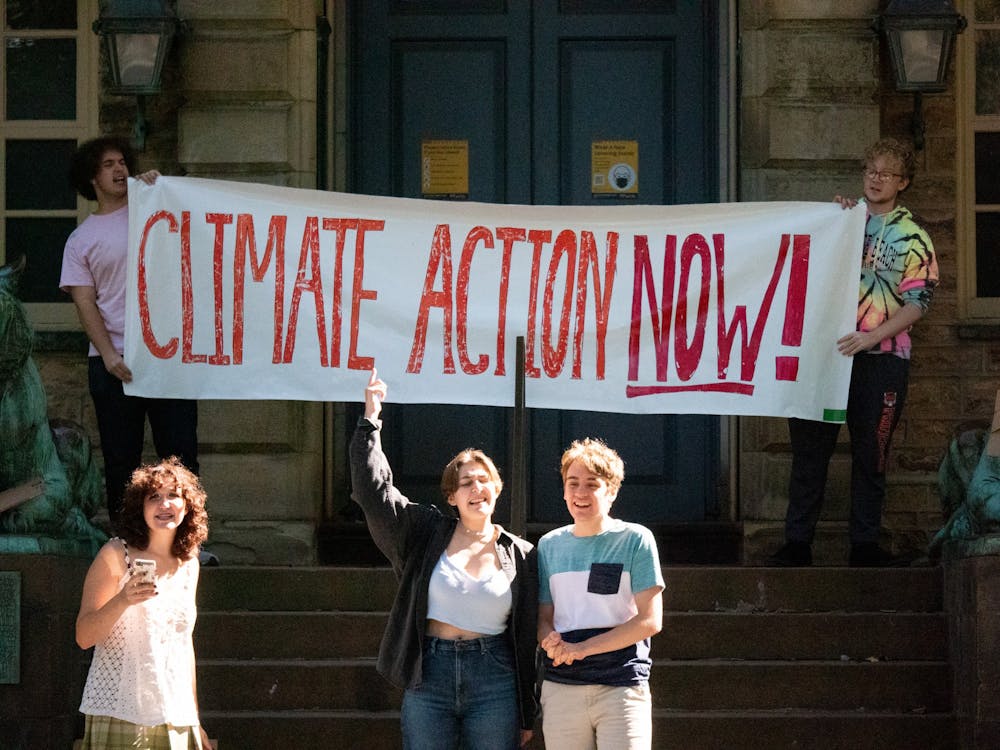On Sept. 24, one of the tiger statues in front of Nassau Hall was adorned with a sign: “CLIMATE ACTION NOW!” Spilling down the steps and onto the lawn were groups of students, holding signs of their own: “#BREAK UP WITH EXXON.” “DELAY IS DENIAL.” “WAKE UP.” All of them had assembled to urge Princeton to follow in the footsteps of many of its fellow universities and divest from fossil fuels. From those steps, protesting students asked the University a crucial question: “Which side are you on?”
It isn’t clear whether Princeton is on the side of divestment. While some schools like Harvard have made the choice to completely divest their endowments from fossil fuels, Princeton has failed to do so. An announcement from the Board of Trustees released in May 2021 outlined a committee to examine Princeton’s holdings, as well as a partial divestment from thermal coal and tar sands segments of the fossil fuel industry and companies responsible for spreading misinformation about climate change. Simultaneously unwilling to divest from some long-term fossil fuel holdings and unable to ignore the angry pleas of its students, the University has instead opted for an uncomfortable middle ground.
Princeton cites a 1987 Statement of the Trustees as justification for only partially divesting. The Statement establishes that “for Princeton, divestiture means dissociation,” and that Princeton undertakes divestment only when “a company’s behavior conflicts substantially with the central values of the University.” Yet investing in a company that is contributing to climate change is certainly not in the “service of humanity” — indeed, it is the opposite. In order to truly embody its central values, Princeton must fully divest.
Princeton’s continued partnerships with certain companies reveal that “partial divestment” is virtually meaningless. Despite vowing to examine Princeton’s holdings and partnerships, the University continues to work with ExxonMobil, which has recently lobbied against parts of a major social and climate spending bill proposed by the Democrats. The University claims that this partnership is to fund research for renewable fuels and further climate solutions. However, Ryan Warsing of Divest Princeton notes that while Exxon’s work may yield some valuable information, their true goal (exposed in a leaked exchange from 1998) is to “monitor and serve as an early warning system for scientific development with the potential to impact on the climate science debate.” Exxon’s commitment to climate research is in name only, and the company actively opposes climate legislation — yet Princeton still partners with them, feeding climate change rather than combating it.
Just a few days ago, climate activist Greta Thunberg’s “Blah, Blah, Blah” speech went viral. She furiously criticized world leaders for their inaction, pointing to phrases like “net-zero by 2050” and “green economy,” saying, “This is all we hear from our leaders. Words that sound great, but so far have led to no action. Our hopes and dreams drowned in their empty words and promises.”
Princeton has followed the example of the leaders Thunberg criticized: saying plenty, but doing little. Both the Board announcement and the Sustainability Initiative are incredibly vague — the announcement declared Princeton’s intention to create committees to assess the impact of those holdings and “reduce the aggregate harmful climate impact” of those holdings, while the Sustainability Initiative states that “known and unknown strategies” will shape Princeton’s path to carbon neutrality. Both documents are filled with the “buzz words” that Thunberg mentioned, yet both seem to lack the resolve to create meaningful action.
Rather than spouting buzzwords and continuing problematic partnerships, Princeton should be taking action against the fossil fuel companies that are fueling climate change (or at the very least, stop supporting them) and investing in companies that are truly committed to combating it. In doing so, the University can help in the process of developing renewable energy and reducing the carbon emissions that are raising the global temperature.
Furthermore, changes at the university level can prompt greater change at the state level. Universities are not the only ones debating divestment — this past June, Maine Governor Janet Mills signed a bill to divest state investments from fossil fuels, making Maine the first state to commit to fossil-fuel divestment. There are active campaigns for the same cause in states like New York, California, Colorado, and New Jersey. By joining Rutgers University in divesting from fossil fuels, Princeton can put pressure on other universities — and New Jersey itself — to divest. Not only would Princeton’s divestment remove support from fossil fuel companies it previously invested in, but it may help to spark widespread divestment that could deal a major blow to the fossil fuel industry.

As those who stand to inherit a rapidly heating Earth, we cannot allow Princeton to favor promises and committees over decisive action, especially when our own divestment could push other universities or even states to do the same. The protest on Sept. 24 was not the first, and it cannot be the last. Yet as protests continue, it is essential that more students participate — a more significant portion of the student body has a greater chance of eliciting a response from the University. Ultimately, we as students have the power to shape the University’s policies by placing pressure on Princeton. If we succeed, Princeton’s action could put pressure on New Jersey itself.
So stop talking, Princeton. It’s time to pick a side.
Lucia Wetherill is a first-year from Newtown, Pa. She can be reached at lw2158@princeton.edu.









